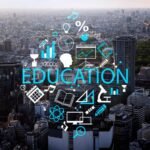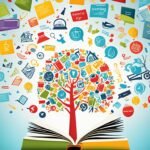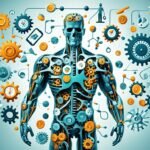Education Important : Education plays a pivotal role in shaping individuals, communities, and the world. It is not just about gaining knowledge, but also about personal growth, societal benefit, and economic prosperity. Education provides individuals with the tools, skills, and opportunities necessary to thrive in today’s society. Let’s explore why education is important for everyone.
Key Takeaways
- Education is the key to personal growth, societal benefit, and economic prosperity.
- It provides stability, financial security, and independence.
- Education promotes global connection, self-confidence, and awareness.
- It fosters appreciation, productivity, and personal growth.
- Education is crucial for children’s development and future success.
Stability and Financial Security
Education plays a crucial role in providing stability and financial security to individuals. By acquiring knowledge and skills through education, individuals gain a competitive edge in the job market and open doors to better career opportunities.
A college degree, in particular, is often associated with higher earning potential. According to recent studies, individuals with higher education tend to earn higher salaries compared to high school graduates. This increase in income contributes to financial stability and provides individuals with the means to lead a comfortable life.
Furthermore, education goes beyond academic knowledge and equips individuals with essential soft skills that are sought after by employers. Skills like effective communication, budgeting, time management, problem solving, and critical thinking are crucial in the workplace. These skills enhance employability and contribute to job stability in an ever-changing economy.
Moreover, the financial independence that comes with higher education enables individuals to pursue lifelong learning opportunities. They have the freedom to continuously upgrade their skills, stay relevant in their careers, and adapt to new industry demands. This continuous growth and development not only contribute to personal satisfaction but also provide a sense of security in an unpredictable job market.
Benefits of Higher Education for Financial Security and Stability:
- Increased job opportunities
- Higher earning potential
- Improvement in employability skills
- Greater job stability
- Freedom for lifelong learning and professional development
| Benefits | Higher Education | High School Education |
|---|---|---|
| Job Opportunities | Expanded range of options | Limited options |
| Earning Potential | Higher salaries | Lower salaries |
| Employability Skills | Developed soft skills | Limited soft skills |
| Job Stability | Greater stability | Less stability |
| Lifelong Learning | Continual growth and development | Limited opportunities |
Investing in higher education not only provides stability and financial security on an individual level but also contributes to the overall economic growth of a nation. It creates a more skilled workforce, attracts businesses, and fosters innovation and productivity.
By recognizing the importance of education in attaining stability and financial security, individuals can make informed decisions about their educational journeys and unlock a brighter and more prosperous future for themselves.
Independence and Goal Attainment

Education plays a vital role in empowering individuals to achieve financial independence. By acquiring knowledge and skills through education, individuals gain the qualifications necessary to secure well-paying jobs and meet their financial needs without relying on others for support. This financial independence provides individuals with the freedom and autonomy to shape their lives according to their own aspirations and goals.
Furthermore, education facilitates goal attainment by equipping individuals with the tools and mindset necessary to set and achieve personal and professional objectives. The educational journey instills perseverance, determination, and a sense of purpose, enabling individuals to overcome challenges and obstacles along the way. By investing in their education and persisting in their pursuit of knowledge, individuals can attain the goals they have set for themselves.
“Education is the passport to the future, for tomorrow belongs to those who prepare for it today.” – Malcolm X
This mindset of goal attainment carries over into other aspects of life, extending beyond the educational sphere. Individuals who have experienced success in their educational journey are more likely to approach other areas of life with the same determination and focus, setting high expectations for themselves and striving to achieve them.
Benefits of Independence and Goal Attainment:
- Personal Fulfillment: Attaining goals brings a sense of personal fulfillment and satisfaction, contributing to overall well-being.
- Self-Reliance: Independence allows individuals to rely on their own capabilities and resources, fostering self-confidence and resilience.
- Career Advancement: Goal attainment in education often leads to improved career prospects and the potential for professional growth.
- Financial Security: Independence and goal attainment often result in greater financial stability and the ability to provide for one’s own needs and wants.
In conclusion, education not only empowers individuals to achieve financial independence but also enables them to set and strive for personal and professional goals. The knowledge and skills acquired through education lay the foundation for a more secure and fulfilling life, fostering independence and a lifelong pursuit of success.
Global Connection and Self-Confidence

Education plays a crucial role in fostering global connection and self-confidence. Through education, individuals gain a deeper understanding of history, cultures, and different perspectives, which promotes appreciation and cultural understanding.
By learning about the contributions of various cultures, individuals develop a sense of empathy and acceptance. This understanding of the world beyond oneself enables individuals to seek peaceful resolutions to conflicts and contribute to a more harmonious society.
“Education is not the filling of a pot, but the lighting of a fire.” – William Butler Yeats
Moreover, education builds self-confidence by allowing individuals to explore new interests, achieve personal and professional growth, and develop a strong sense of self-worth. Through education, individuals gain the knowledge and skills necessary to express their opinions, share their experiences, and make a positive impact on others and the world.
Educational experiences provide individuals with the opportunity to engage in meaningful conversations, both locally and globally. This fosters a sense of belonging and connection to a larger community, building bridges across geographical and cultural boundaries.
The Benefits of Global Connection and Self-Confidence
When individuals develop a global connection and self-confidence through education, they experience numerous benefits:
- Cultural Understanding: Education exposes individuals to diverse cultures, fostering appreciation, tolerance, and respect for others.
- Collaboration: Global connection and self-confidence facilitate collaboration among individuals from different backgrounds, leading to mutual growth and innovation.
- Empathy: By understanding and engaging with different perspectives, individuals develop empathy and a deeper understanding of the experiences of others.
- Open-Mindedness: A global connection and self-confidence build open-mindedness, enabling individuals to embrace new ideas and perspectives.
By fostering global connection and self-confidence, education equips individuals with the skills and mindset needed to engage in a diverse and interconnected world.
| Benefits | Description |
|---|---|
| Cultural Understanding | Developing appreciation, tolerance, and respect for diverse cultures. |
| Collaboration | Facilitating cooperation and innovation among individuals from different backgrounds. |
| Empathy | Understanding and relating to the experiences and perspectives of others. |
| Open-Mindedness | Embracing new ideas and perspectives with receptiveness and curiosity. |
Economic Growth and Awareness
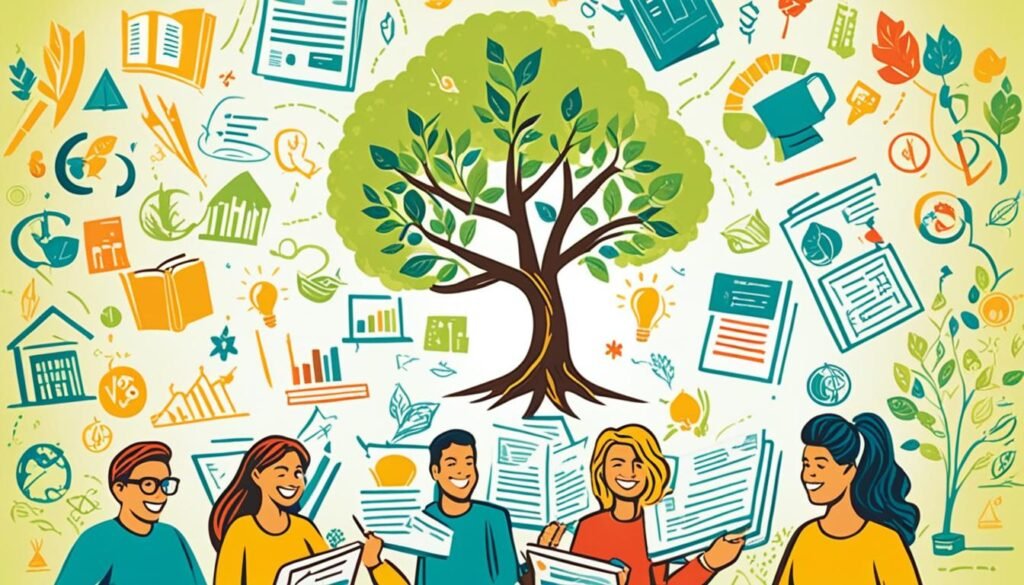
Education plays a crucial role in fostering economic growth and creating opportunities for individuals and nations. Higher literacy rates are often associated with improved economic projections, increased employment opportunities, and higher-paying jobs.
An educated population is better equipped to adapt to changes in the global economy and take advantage of emerging job markets. With a solid educational foundation, individuals are more likely to have the skills and knowledge needed to succeed in the modern workforce.
Furthermore, education raises awareness of legal obligations, such as labor laws and workers’ rights, ensuring individuals are protected and have access to fair employment practices. It also reduces susceptibility to scams and conspiracy theories, as education promotes critical thinking and the ability to discern reliable information.
One important aspect of education is health literacy, which refers to the knowledge and understanding of health information. By promoting health literacy, education empowers individuals to make informed choices about their well-being, seek appropriate healthcare, and engage in preventive measures.
Education is the key to economic growth and increased awareness. It equips individuals with the skills and knowledge necessary to thrive in the workforce and contribute to a prosperous society.
Productivity and Personal Growth

Education plays a vital role in enhancing productivity and fostering personal growth. By equipping individuals with essential skills and knowledge, education empowers them to manage multiple tasks efficiently and produce high-quality work. Through education, individuals develop valuable skills such as time management and multitasking, which are transferable to the workplace and contribute to increased productivity.
Moreover, education promotes lifelong learning, the continuous process of acquiring knowledge and skills throughout one’s life. Lifelong learning enables individuals to stay updated with the latest advancements in their field, explore new ideas, and expand their understanding of the world. It encourages individuals to ask questions, challenge assumptions, and seek knowledge, leading to personal growth and the realization of their full potential.
Embracing lifelong learning allows individuals to adapt to evolving industries and technologies, enhancing their employability and professional development. The pursuit of knowledge and growth not only benefits individuals but also contributes to the overall advancement of society.
The Benefits of Lifelong Learning
Lifelong learning offers numerous benefits for personal and professional development. Here are some key advantages:
- Continuous Skill Development: Lifelong learning allows individuals to acquire new skills and expand their expertise, making them valuable assets in the workforce.
- Adaptability: By staying updated with industry trends and advancements, individuals can adapt to changing environments and embrace new opportunities.
- Increased Confidence: Continuous learning fosters self-confidence and self-assurance as individuals gain knowledge and expertise in their desired areas.
- Expanded Network: Engaging in lifelong learning activities, such as workshops and seminars, provides opportunities to connect with like-minded individuals and expand professional networks.
- Personal Fulfillment: Lifelong learning broadens horizons, stimulates intellectual curiosity, and enriches lives, leading to personal fulfillment and a sense of purpose.
“The more that you read, the more things you will know. The more that you learn, the more places you’ll go.” – Dr. Seuss
Investing in education and embracing lifelong learning is a transformative journey that transcends traditional classroom settings. It enables individuals to continuously grow, adapt, and contribute to their personal enrichment and the betterment of society as a whole.
Information Access and Appreciation

Education plays a crucial role in equipping individuals with the skills necessary to access and evaluate information critically. Through education, individuals learn research skills and develop the ability to question sources for reliability and impartiality. This enables them to make informed decisions and better navigate the vast amount of information available in today’s digital age.
Education also exposes individuals to a wide range of topics, artistic expressions, and cultural contributions from around the world. This exposure fosters an appreciation for the richness of global diversity, allowing individuals to develop a broader perspective and understanding of different cultures and societies.
One of the many benefits of education is the opportunity to experience scientific discoveries, new types of music, and works of art. Education expands individuals’ horizons and deepens their understanding of the world, enabling them to appreciate the beauty in life and gain insights and experiences that may not be readily accessible to everyone.
Through education, individuals are empowered to explore various forms of artistic expressions, such as paintings, sculptures, literature, and music. This exposure nurtures creativity, encourages self-expression, and promotes a deeper appreciation for the arts.
By integrating education and information access, individuals can develop a well-rounded understanding of the world and cultivate an appreciation for scientific discoveries and artistic expressions. Education unlocks opportunities for growth, exploration, and personal development, enhancing individuals’ ability to engage with and appreciate the diverse wonders of our world.
Examples of Scientific Discoveries and Artistic Expressions
| Scientific Discoveries | Artistic Expressions |
|---|---|
| Discovery of penicillin by Alexander Fleming | Mona Lisa by Leonardo da Vinci |
| The theory of relativity by Albert Einstein | Symphony No. 9 by Ludwig van Beethoven |
| The discovery of DNA by James Watson and Francis Crick | Les Misérables by Victor Hugo |
Education Is Important for Children
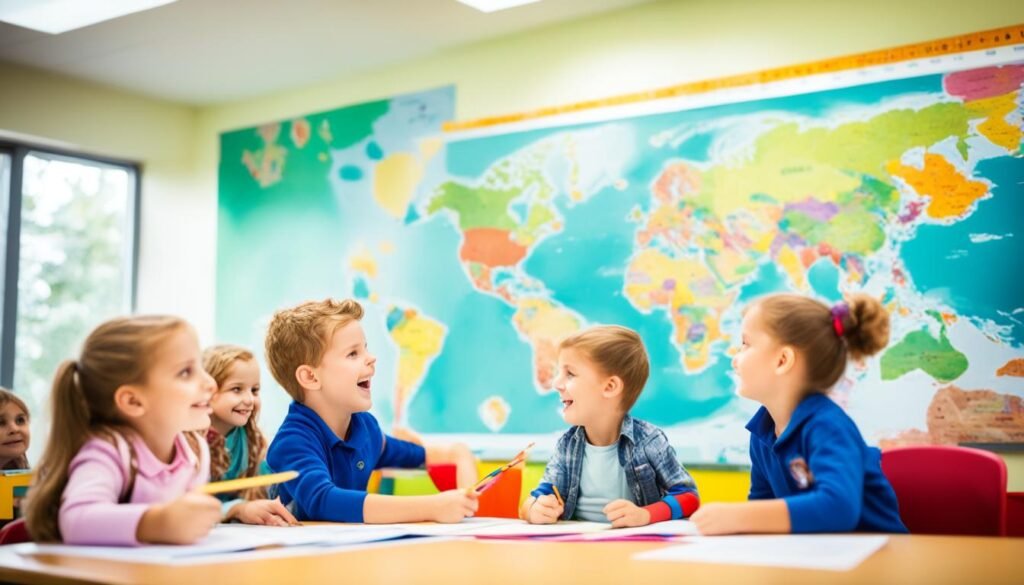
Education plays a crucial role in children’s development and sets the foundation for their future success. It is through education that children acquire the knowledge, skills, and values necessary to navigate the world and reach their full potential. From early childhood education to primary and secondary schooling, every stage of education contributes to their personal growth and prepares them for the challenges and opportunities that lie ahead.
One of the key benefits of education for children is its role in social and mental skill development. By engaging with their peers and teachers in a structured learning environment, children learn how to communicate effectively, collaborate, and develop important social and emotional skills. Education fosters teamwork, empathy, and resilience, which are vital for building healthy relationships and navigating various social settings.
Furthermore, education teaches children problem-solving skills, enabling them to approach challenges with critical thinking and creativity. Through problem-solving activities, children learn how to analyze situations, think logically, and find innovative solutions. These skills not only benefit them academically but also prepare them for future careers that require adaptability and innovative thinking in an ever-changing world.
Education also plays a significant role in promoting self-reliance and empowerment among children. By gaining knowledge and skills, children develop a sense of independence and confidence in their abilities. They learn how to take initiative, make decisions, and take responsibility for their own learning. This sense of empowerment carries over into other aspects of their lives, enabling them to face challenges and make positive choices that contribute to their personal growth and well-being.
Additionally, education fosters equality in society by providing equal opportunities for all children, regardless of their background or circumstances. It promotes inclusion and diversity, ensuring that every child has access to quality education and the chance to succeed. By instilling values of fairness and respect, education helps create a more inclusive and equitable society where every child can thrive.
“Education is the most powerful weapon which you can use to change the world.” – Nelson Mandela
Education also shapes children’s values, promoting creativity and innovation. It exposes them to a variety of knowledge and experiences, expanding their horizons and encouraging them to think critically about the world around them. Through art, music, literature, and scientific exploration, children develop a deeper appreciation for cultural diversity, creativity, and the wonders of the natural world. Education sparks curiosity and nurtures a lifelong love for learning.
Moreover, education equips children with essential life skills necessary for their overall growth and well-being. It teaches them how to communicate effectively, manage their time, make informed decisions, and prioritize their responsibilities. These foundational skills support children in their personal lives, future careers, and relationships, enabling them to thrive in an increasingly complex and interconnected world.
The Impact of Education on Childhood Development
By investing in children’s education, parents, teachers, and society at large contribute to their holistic development. Education helps children become well-rounded individuals who are equipped with the knowledge, skills, and values needed to navigate the challenges and embrace the opportunities of the modern world. It is not only a means to academic success but also a transformative force that shapes children’s character, values, and future aspirations.
Education empowers children to dream big, pursue their passions, and make a positive impact on the world. From early childhood education to higher studies, every stage of the educational journey lays the groundwork for personal growth, lifelong learning, and the pursuit of excellence.
Education is the key that unlocks the potential within every child, providing them with the tools and opportunities they need to thrive in an ever-changing world. By investing in education for children, we invest in a brighter future for individuals, communities, and society as a whole.
Education is vital for the growth and success of individuals and societies alike. Its importance is evident in today’s society, where access to education, both formal and informal, defines individuals and contributes to society as a whole. Non-formal education, including digital education, expands horizons and helps us understand and appreciate the world around us.
A bachelor’s degree will make a person more likely to navigate life successfully, as education tends to lead to stable and secure communities. Ten reasons underscore why education is so important: it helps children and adults develop critical and logical thinking, enables them to make sound decisions, and equips them with basic life skills.
Moreover, education reduces child mortality and opens up opportunities for growth, contributing to families and society. Education also pays off in the long run, both for individuals and for society as a whole, by creating a better, more prosperous society. Millions of children, including girls and women, benefit from early childhood education, which not only helps them in their daily lives but also prepares them to contribute to their families and communities.
Quality education not only helps individuals but also contributes to modern society by fostering a better understanding of the world and promoting a stable community. As education gives individuals the tools they need to thrive, it is important for children to have access to proper education, as it helps them become productive members of society who are able to make sound decisions and contribute to a better society.
Also Read : Top Driving Schools For Safe & Skilled Learning
Conclusion
Education plays a vital role in shaping our lives and society. It provides stability, financial security, and independence for individuals. Through education, we can achieve our goals and dreams, contributing to the growth of our communities and the world.
Education is not just about acquiring knowledge; it also fosters global connection and self-confidence. It promotes economic growth, awareness, appreciation for diversity, and personal growth. Education equips us with the ability to access information, evaluate sources, and make informed decisions.
Furthermore, education is crucial for children’s development and future success. It helps them build a strong foundation for a fulfilling life, instilling values, creativity, and essential life skills. Education empowers children to become independent thinkers, problem solvers, and active contributors to a better future.
Education is a lifelong journey that never ends. It empowers individuals to continue learning, growing, and creating a positive impact. Embracing the importance of education not only benefits individuals but also strengthens society as a whole. Let us recognize the power of education and strive to provide equal opportunities for everyone to benefit from its transformative impact.
FAQs
Q: Why is education important for everyone?
A: Education is important for everyone because it provides individuals with knowledge, skills, and abilities that are essential for personal and professional development. It helps in shaping individuals into responsible and productive members of society.
Q: What are the benefits of education?
A: Education has numerous benefits, such as improving critical thinking skills, enhancing communication abilities, increasing job opportunities, and promoting social and economic development.
Q: What are the reasons why education is important?
A: Education is important because it empowers individuals, creates opportunities for personal growth, enhances self-confidence, and enables individuals to make informed decisions in various aspects of life.
Q: How does education play a role in modern society?
A: Education plays a crucial role in modern society by fostering innovation, promoting cultural understanding, reducing poverty levels, and contributing to the overall progress and well-being of a nation.
Q: What are the different types of education available?
A: There are various types of education including formal education (such as school and university education), non-formal education (such as workshops and vocational training), and informal education (such as self-directed learning and life experiences).
Q: How can we make education more accessible to children and adults?
A: We can make education more accessible by investing in educational infrastructure, providing scholarships and financial aid, promoting inclusive education policies, and reinforcing the importance of lifelong learning.
Q: What are 10 reasons highlighting the importance of education?
A: Some of the reasons why education is important include acquiring knowledge and skills, improving economic opportunities, fostering personal growth, enhancing social interactions, promoting cultural awareness, empowering individuals, reducing poverty, enhancing global competitiveness, shaping future generations, and contributing to societal progress.
Source Links
- https://www.gcu.edu/blog/teaching-school-administration/why-education-important
- https://www.uopeople.edu/blog/10-reasons-why-is-education-important/
- https://www.worldvision.ca/stories/education/why-is-education-important
